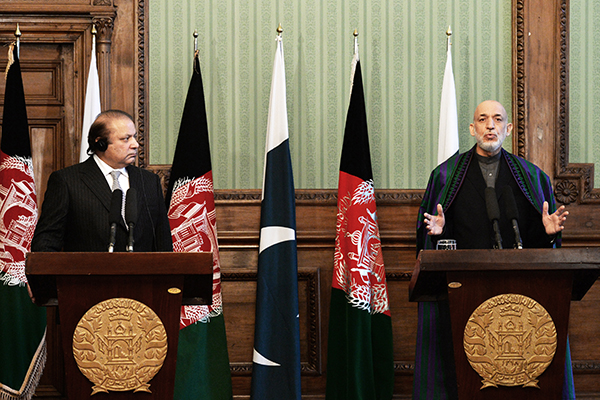
Aref Karimi—AFP
Pakistan’s own ‘peace’ talks with the local Taliban have stalled.
Pakistan’s Prime Minister Nawaz Sharif wants neighboring Afghanistan to “reverse the destructive cycle of conflict” by pursuing peace terms with the Afghan Taliban.
Speaking at a joint press appearance with Afghan President Hamid Karzai in Kabul on Saturday, Sharif said, “The key to sustainable peace in Afghanistan in 2014 and beyond is an inclusive political settlement.” He urged “all the stakeholders to seize this moment and join hands to support peace efforts,” and he promised that “Pakistan will continue to extend all possible facilitation for the Afghan peace process.”
Sharif’s own initiative, backed by an all-parties consensus, to settle peace terms with the Pakistani Taliban has collapsed. Yesterday, his handpicked nominee, Gen. Raheel Sharif, became Pakistan’s 15th Army chief—a development that is widely seen as giving Prime Minister Sharif greater say in national-security matters, including on how to deal with Afghanistan after NATO troops pull out in 2014.
Relations between Afghanistan and Pakistan remained turbulent during the presidency of Asif Ali Zardari, who became a close friend of Karzai’s. The unpredictable Afghan president, whose last term in office runs out next year, maintains acute bitterness toward Pakistan’s military, which he accuses of siccing nonstate militants on his country. Pakistan’s Army is also accused of harboring Afghan Taliban supremo Mullah Omar, allegedly in Quetta. Pakistani military and civilian leaders, including Zardari’s late wife and leader, Benazir Bhutto, had supported the Taliban during the 1990s.
Sharif repeated that his government had released former Taliban No. 2 Mullah Baradar, who is seen by Kabul as important to bringing the militants to the negotiating table. But militant sources have complained that Baradar is effectively still behind bars in Pakistan.
Karzai seemed to welcome Sharif’s reiterating support for talks with the Taliban. “There is no doubt that since [Sharif] has taken office … cooperation and relations with Afghanistan have expanded,” he said. “Today we talked on how to proceed with the peace process, the American role in the peace process; and on how America, Pakistan and Afghanistan can jointly cooperate.” He provided no details for such cooperation.
Sharif was also due to meet with the Afghan High Peace Council and its chairman Salahuddin Rabbani. The Afghan Taliban have refused direct contacts with either Karzai or the peace council, dismissing them as puppets of Washington. Afghan officials have said that Kabul expects Islamabad to stop militants crossing the border to launch attacks in the run-up to the April presidential elections for Karzai’s successor.
Sharif also announced increasing Pakistan’s commitment for Afghanistan’s socioeconomic development programs from $385 million to $500 million. He discussed with Karzai the proposed Peshawar-Kabul motorway and other projects to expand road and rail networks connecting their countries as well as the use of Afghan territory to import gas and electricity from Central Asia to Pakistan. Both men also agreed to work on enhancing annual bilateral trade to $5 billion by 2015.
Sharif last met Karzai in October in London. This was his first visit to Afghanistan after becoming prime minister in June. His delegation included advisers Sartaj Aziz and Tariq Fatemi and foreign secretary Jalil Jilani. Karzai visited Pakistan in August.
